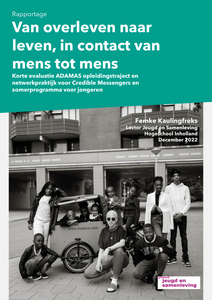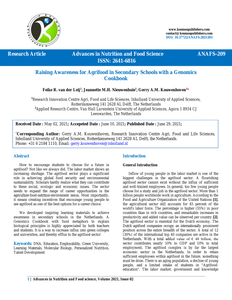Korte evaluatie ADAMAS opleidingstraject en netwerkpraktijk voor Credible Messengers en zomerprogramma voor jongeren
DOCUMENT

In response to a rapidly changing, increasingly insecure and complex labor market, career counselors and researchers are developing methods that can meet the needs of individuals who would navigate this new terrain. In the last two or three decades, narrative career counseling practices (Cochran, 1997; McMahon & Watson, 2012; Reid & West, 2011; Savickas, 2012) have been developed to promote career adaptability (Savickas, 2011) and career resilience (Lyons, Schweitzer & Ng, 2015). Narrative counseling (i.e. career construction) is founded on the idea that in order to survive and thrive on the labor market of the 21st century, individuals must reflexively construct their identities in a process of meaning making, where identity is co-constructed in the form of a narrative: a story about who one is that provides both meaning and direction (Wijers & Meijers, 1996). LinkedIn: https://www.linkedin.com/in/reinekke-lengelle-phd-767a4322/
MULTIFILE

Western societies are quickly becoming less coherent (Giddens, 1991). As a result it is increasingly unclear how individuals should act in a range of situations or how they may understand themselves. To a certain extent this development towards more diverse perspectives and a broader range of ways to act is a positive one, as cultures can only develop as they are confronted with different perspectives. A uniform culture would simply reach a standstill. That said, current society now demands of its citizens that they become increasingly self-reliant and by extension develop a capacity to be self-governing. On the labour market self-reliance and self-determination have been considered par for the course even longer. It is no surprise then that terms like self-direction, self-governing teams, employability and resilience are considered part of the standard repertoire of politicians and employers (Van der Heijden & De Vos, 2017). Within the social sciences, an ability to be self-governing and self-reliant are terms that are associated with the concept “agency”. However, the latter is a fairly vague, multidimensional concept (Arthur, 2014) that refers to the ‘scope of action’ an individual has in a fluid society (Bauman, 2000). In this article we would like to explore the concept of ‘agency’ further whereby we focus on the role of imagination in enacting it. https://doi.org/10.1177/1038416218777832 LinkedIn: https://www.linkedin.com/in/reinekke-lengelle-phd-767a4322/
MULTIFILE

How to encourage students to choose for a future in agrifood? Not like we always did. The labor market shows an increasing shortage. The agrifood sector plays a significant role in achieving global food security and environmental sustainability. Scholars hardly realize what they can contribute to these social, ecologic and economic issues. The sector needs to expand the range of career opportunities in the agriculture-food-nutrition-environment nexus. Most importantly, it means creating incentives that encourage young people to see agrifood as one of the best options for a career choice.Inspiring learning materials have been developed to achieve awareness in secondary schools in the Netherlands. A Genomics Cookbook with food metaphors to explain biological principles is highly appreciated by both teachers and students. It is a way to increase influx into green colleges and universities, and thereby efflux to the agrifood sector.
DOCUMENT

How to encourage students to choose for a future in agrifood? Not like we always did. The labor market shows an increasing shortage. The agrifood sector plays a significant role in achieving global food security and environmental sustainability. Scholars hardly realize what they can contribute to these social, ecologic and economic issues. The sector needs to expand the range of career opportunities in the agriculture-food-nutrition-environment nexus. Most importantly, it means creating incentives that encourage young people to see agrifood as one of the best options for a career choice. We developed inspiring learning materials to achieve awareness in secondary schools in the Netherlands. A Genomics Cookbook with food metaphors to explain biological principles is highly appreciated by both teachers and students. It is a way to increase influx into green colleges and universities, and thereby efflux to the agrifood sector.
MULTIFILE

Met bijdragen van Matthijs Rotte, Niniane Veldhoen, Kevin Oudshoorn, Tom Jansen, Wiel van Horck, Bram Koopman, Joshua Hazelaar. Bevat samenvattingen van de eerste afstudeeropdrachten (2009) van het lectoraat Crossmedia.
DOCUMENT

Deze review van de literatuur richt zich in het bijzonder op de sociale dynamiek rondom geweld in de publieke ruimte. In gevallen waarin de online dynamiek het gebruik van geweld oproept of stimuleert spreken we van ‘online aanjaging’. Hoe kunnen netwerkpartners die verantwoordelijk zijn voor de openbare orde en veiligheid zich in deze online dynamiek mengen, en welke gevolgen heeft de online aanwezigheid van deze netwerkpartners? Gemeenten werken in deze vraagstukken samen aan een integrale aanpak in een netwerk van partners zoals politie en jongerenwerk, maar ook scholen en reclassering. Om het raakvlak met het werkveld voldoende te borgen is de review aangevuld met een stakeholdersbijeenkomst van AcVZ met netwerkpartners, waarnaar we op relevante plaatsen in dit rapport verwijzen. Deze vond plaats voordat de review is uitgevoerd.
DOCUMENT

Hoofdstuk 2 gaat over peer en professionele online support voor ouders bij het opvoeden. In totaal bevat het boek 31 hoofdstukken over sociaal netwerken, geschreven door tientallen onderzoekers wereldwijd.
MULTIFILE

In this paper I describe the ways in which the communication discipline can make a hidden crisis transparent. For this purpose I examine the concept of crisis entrepreneurship from a communication point of view. Using discourse analysis, I analyse the discursive practices of crisis entrepreneurs in the domain of education in the Netherlands. This paper is part of my Ph.D. project in which I examine the dilemmas encountered by crisis entrepreneurs and the interactional solutions they choose in addressing a crisis. In my Ph.D. project I have analysed how crisis entrepreneurs use discursive practices: (1) to show the factuality of the problem. For example, the way the problem is presented is too theoretical and is not a problem in reality; (2) to present the credibility of the messenger as an authentic, legitimate spokesman. Crisis entrepreneurs may be accused of wanting to attract attention to their own cause; (3) to create the accountability for the problem and the solution. For example, crisis entrepreneurs can be accused of nursing personal grievances or of drawing attention to the issue without actively attempting to solve it. The conclusion is that a communication professional is able to recognize a problem raised by crisis entrepreneurs. Knowledge of interactional dilemmas helps communication professionals understand the potential of crisis entrepreneurs.
DOCUMENT

In this paper I describe the ways in which the communication discipline can make a hidden crisis transparent. For this purpose I examine the concept of crisis entrepreneurship from a communication point of view. Using discourse analysis, I analyse the discursive practices of crisis entrepreneurs in the domain of education in the Netherlands. This paper is part of my Ph.D. project in which I examine the dilemmas encountered by crisis entrepreneurs and the interactional solutions they choose in addressing a crisis. In my Ph.D. project I have analysed how crisis entrepreneurs use discursive practices: (1) to show the factuality of the problem. For example, the way the problem is presented is too theoretical and is not a problem in reality; (2) to present the credibility of the messenger as an authentic, legitimate spokesman. Crisis entrepreneurs may be accused of wanting to attract attention to their own cause; (3) to create the accountability for the problem and the solution. For example, crisis entrepreneurs can be accused of nursing personal grievances or of drawing attention to the issue without actively attempting to solve it. The conclusion is that a communication professional is able to recognize a problem raised by crisis entrepreneurs. Knowledge of interactional dilemmas helps communication professionals understand the potential of crisis entrepreneurs. A communication professional can therefore contribute to the recognition of crises by acknowledging that a crisis entrepreneur is someone who can have a strong hand in the public agenda, i.e., public affairs that are important to the authorities.
DOCUMENT
